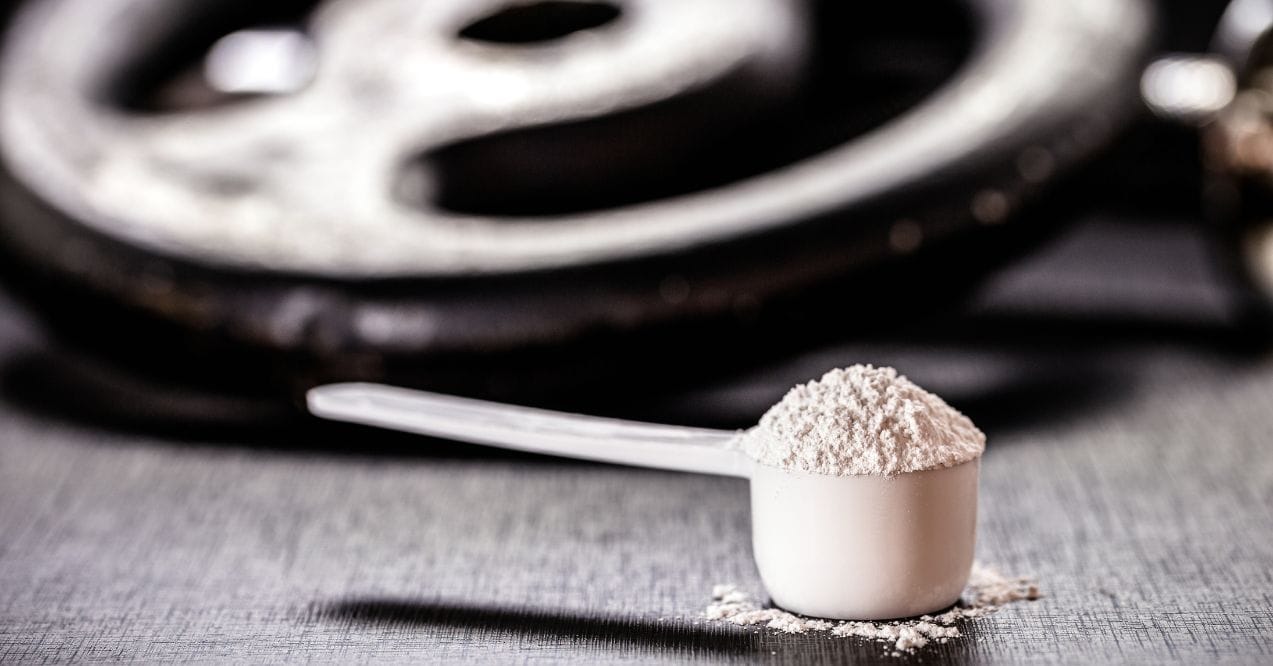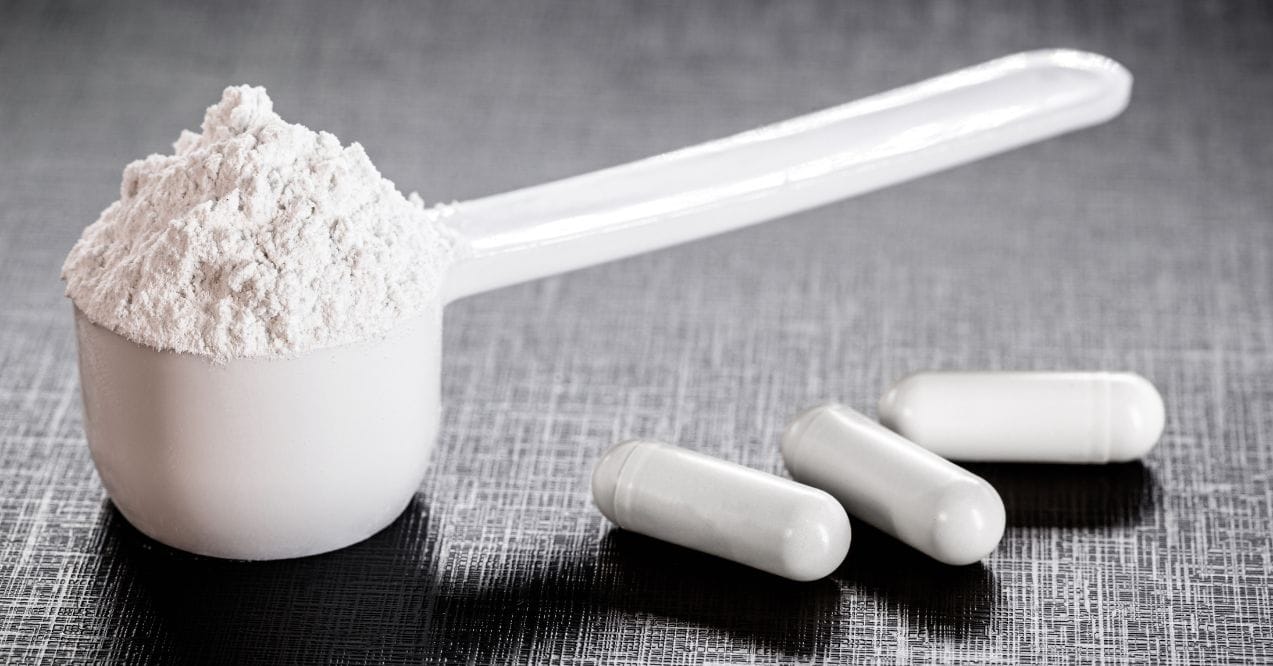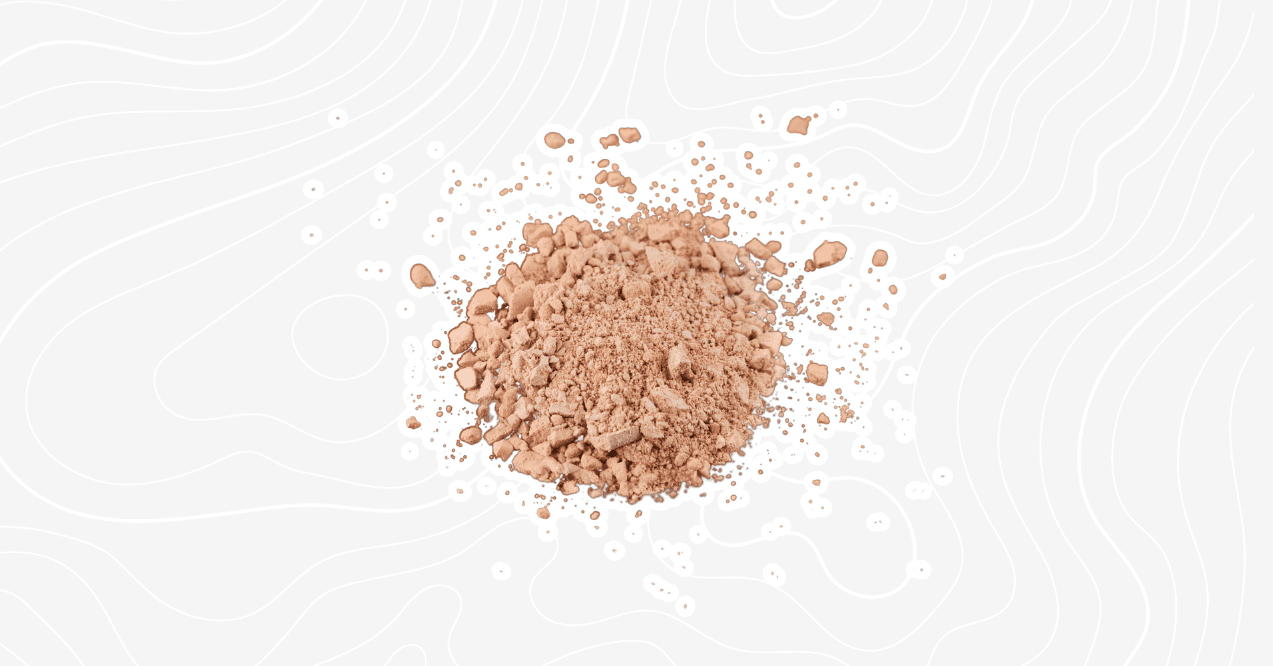Does Creatine Have Caffeine?
Hey there, fitness enthusiasts! Ever found yourself staring at your pre-workout supplements, wondering, does creatine have caffeine? This question pops up more often than you might think, especially among those looking to boost their gym performance.
Today, we’re diving deep into the world of creatine supplements and caffeine, two powerhouse supplements that often share the spotlight in the fitness community. Whether you’re a seasoned gym-goer or just starting your fitness journey, understanding these supplements can be a game-changer for your workouts.
So, grab your shaker bottle, and let’s unravel this mystery together!
Key takeaways:
Does Creatine Have Caffeine? Expert’s Answer
Alright, let’s cut to the chase: No, creatine does not have caffeine. Surprise! These two popular supplements are actually completely separate entities. Here’s the scoop:
- A naturally occurring compound in your body
- Made up of amino acids
- Stored primarily in your muscles
- Helps produce energy for high-intensity, short-duration activities
- A stimulant found in coffee, tea, and some energy drinks
- Not naturally present in your body
- Acts on your central nervous system
- Provides a quick energy boost and increased alertness
So, why the confusion? Well, both creatine and caffeine are often found in pre-workout supplements, which might lead some to think they’re one and the same. But in reality, they’re as different as apples and oranges!
Creatine works by increasing your body’s stores of phosphocreatine, which helps produce ATP (the energy currency of your cells) during high-intensity exercise. This means you can push harder and longer during your workouts.
Caffeine, on the other hand, blocks adenosine receptors in your brain, reducing fatigue and increasing alertness.
You can use creatine daily for its cumulative effects on muscle energy stores, while caffeine is typically used pre-workout for its immediate stimulating effects.
Can You Mix Creatine in Coffee?
Now, here’s where things get interesting. Can you mix creatine in coffee? The short answer is yes, you can! But should you? Well, that depends on a few factors.
Mixing creatine in coffee can be a convenient way to get both supplements in one go, especially if you’re short on time in the morning. The hot liquid can help dissolve the creatine powder, making it easier to consume. Plus, if you’re already a coffee lover, it’s a simple way to incorporate creatine into your routine.
However, there are a few things to keep in mind:
- Timing – Caffeine’s effects peak about an hour after consumption, while creatine works best when taken consistently over time. If you’re mixing them, consider your workout schedule.
- Absorption – Some studies suggest that caffeine might interfere with creatine absorption, although the evidence is mixed. If you’re concerned, you might want to space them out.
- Personal tolerance – Everyone reacts differently to caffeine. If you’re sensitive to it, mixing creatine in your coffee might not be the best idea.
Pros of Combining Creatine and Caffeine
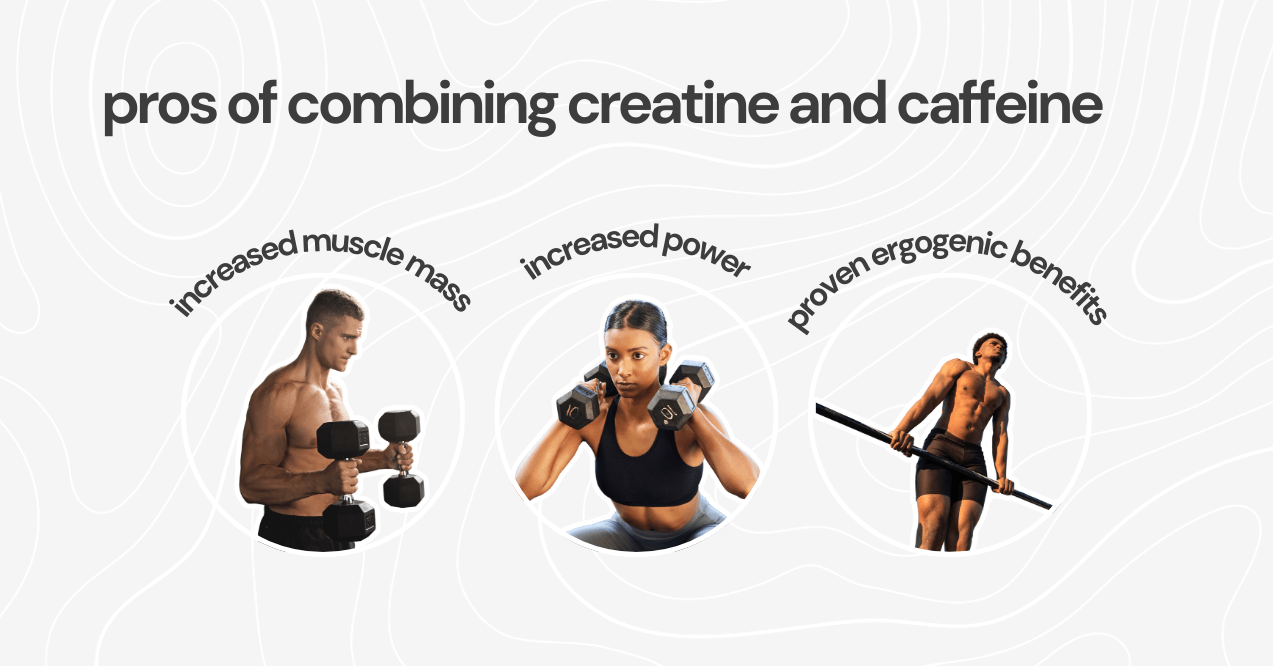
While creatine and caffeine are different supplements, using them together can potentially supercharge your workouts. Let’s break down some of the benefits:
Increased Muscle Mass
When it comes to building muscle, creatine is a heavyweight champion. It helps your muscles store more water, giving them a fuller look and potentially stimulating muscle protein synthesis. Caffeine, while not directly building muscle, can help you push through tougher workouts, potentially leading to greater muscle gains over time.
- Creatine – Increases water content in muscles, potentially stimulating growth
- Caffeine – Helps you work out harder, potentially leading to more muscle growth
Proven Ergogenic Benefits
Both creatine and caffeine are well-studied for their performance-enhancing effects. When used together, they can create a powerful combo for athletic performance.
- Creatine – Enhances high-intensity, short-duration activities
- Caffeine – Improves endurance and reduces perception of effort
- Together – May lead to better overall workout performance
Increased Power
If you’re looking to add some serious oomph to your lifts, the creatine-caffeine combo might be your new best friend.
- Creatine – Boosts available energy for explosive movements
- Caffeine – Increases alertness and reduces perceived effort
- Result – Potentially more power during your lifts and sprints
Cons of Combining Creatine and Caffeine
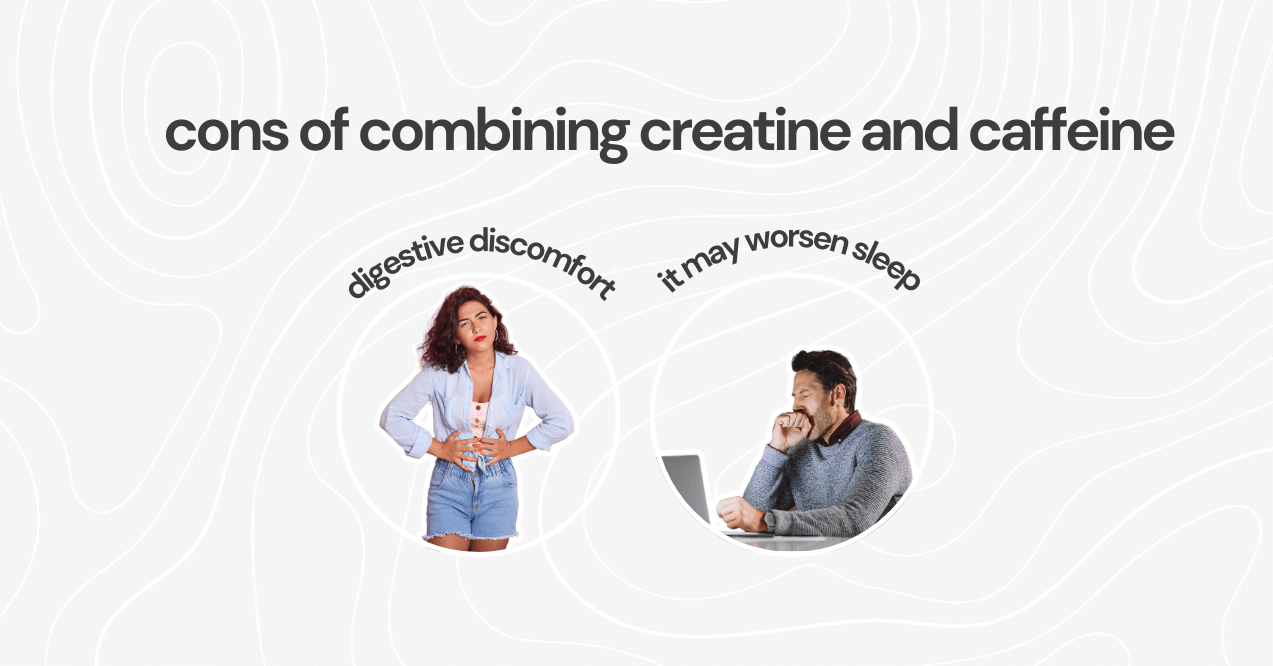
While the creatine-caffeine combo can be a powerful tool, it’s not without potential downsides. Let’s explore some of the cons:
Digestive Discomfort
Both creatine and caffeine can sometimes lead to stomach issues, especially when you’re just starting out.
- Creatine – May cause bloating or increased bowel movement in some people
- Caffeine – Can increase gut motility, potentially leading to more frequent bathroom trips
To minimize discomfort, start with smaller doses and gradually increase. Also, make sure you’re staying well-hydrated!
It May Worsen Sleep
While creatine doesn’t typically affect sleep, caffeine is a different story.
- Caffeine – Can interfere with sleep, especially if consumed later in the day
- Combination – Might lead to sleep issues if taken too close to bedtime
If you’re sensitive to caffeine, consider taking your creatine separately and avoiding caffeine in the afternoon or evening.
Best Practices When Mixing Creatine and Caffeine
Ready to give the creatine-caffeine combo a try? Here are some tips to help you get the most out of it:
- Timing is key – Take your creatine-caffeine mix about 30-60 minutes before your workout for optimal results.
- Start slow – Begin with smaller doses of both supplements and gradually increase to assess your tolerance.
- Stay hydrated – Both creatine and caffeine can increase your need for water, so make sure you’re drinking plenty throughout the day.
- Listen to your body – If you experience any negative side effects, adjust your dosage or timing.
- Be consistent – Creatine works best when taken regularly, so try to incorporate it into your daily routine.
If you’re wondering, Does creatine make you bloated? or Does creatine break a fast?, remember that any initial water weight gain from creatine is temporary and doesn’t affect fat loss.
Looking for a high-quality creatine supplement to elevate your fitness game? Trumeta Creatine might be just what you need. This easy-mixing formula isn’t just about pumping iron – it’s designed to enhance your whole day. Imagine sailing through long work hours with steady energy, or tackling that personal project with laser focus.

Trumeta Creatine aims to support not only your muscle growth and recovery, but also your mental sharpness. It’s for those who want to make every hour count, whether you’re crushing it at the gym or conquering your to-do list.
Conclusion
In conclusion, fitness enthusiasts, the combination of creatine and caffeine offers exciting potential for enhancing muscle mass, boosting workout performance, and increasing power output. However, understanding their differences and using them mindfully is key to achieving optimal results. While creatine itself is caffeine-free, combining it with coffee can be a convenient option—provided you consider factors like timing, personal tolerance, and possible downsides such as digestive discomfort or sleep disturbances. By following best practices, you can unlock the benefits of these supplements while minimizing any unwanted effects, ensuring they support your fitness goals effectively.
Not all creatine is the same. While creatine monohydrate is the most researched and widely used form, other types exist like creatine HCl and buffered creatine. These variants may differ in solubility, absorption, or potential side effects. However, creatine monohydrate remains the gold standard for effectiveness and value.
Yes, you can mix creatine in coffee. The warm liquid helps dissolve the powder, making it convenient for those who enjoy coffee. However, consider timing, as caffeine’s effects peak sooner than creatine’s. Some studies suggest caffeine might affect creatine absorption, so personal experimentation is key to finding what works best for you.
No, creatine does not keep you awake like caffeine. Creatine is not a stimulant. It works by increasing the availability of energy in your muscles, not by directly affecting your nervous system like caffeine does.
No, creatine is not a stimulant. It’s a natural substance found in your body’s muscles and in foods like meat and fish. It plays a role in energy production, primarily during short bursts of high-intensity activity.
Advertisement. This site offers health, wellness, fitness and nutritional information and is designed for educational purposes only. You should not rely on this information as a substitute for, nor does it replace, professional medical advice, diagnosis, or treatment. If you have any concerns or questions about your health, you should always consult with a physician or other health-care professional. Do not disregard, avoid or delay obtaining medical or health related advice from your health-care professional because of something you may have read on this site. The use of any information provided on this site is solely at your own risk.
